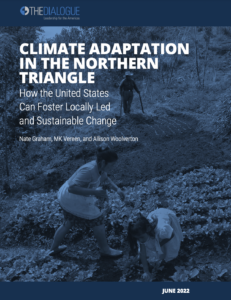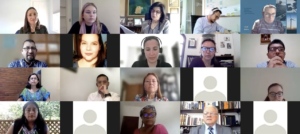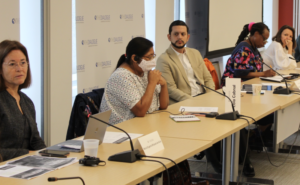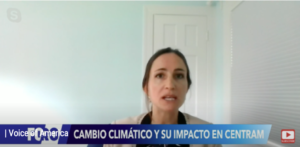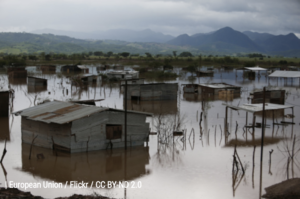Task Force on Climate Change in the Northern Triangle
This post is also available in: Spanish
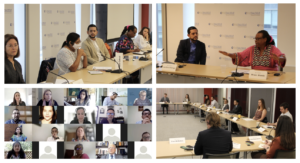 The countries of Central America’s Northern Triangle (El Salvador, Guatemala, and Honduras) are among the most vulnerable in the world to the severe and mounting impacts of climate change. Hurricanes regularly strike the region, compounding preexisting humanitarian and economic crises by displacing hundreds of thousands of people and causing billions of dollars of economic losses. Less predictable weather conditions and a general increase in droughts and floods also threaten large parts of the region’s Dry Corridor that are highly dependent on agriculture. These trends are expected to accelerate as the climate crisis deepens, interacting with other structural factors such as poverty, inequality, corruption, gang violence, weak rule of law, and the continuing impacts of Covid-19 to increase migration, including to the United States.
The countries of Central America’s Northern Triangle (El Salvador, Guatemala, and Honduras) are among the most vulnerable in the world to the severe and mounting impacts of climate change. Hurricanes regularly strike the region, compounding preexisting humanitarian and economic crises by displacing hundreds of thousands of people and causing billions of dollars of economic losses. Less predictable weather conditions and a general increase in droughts and floods also threaten large parts of the region’s Dry Corridor that are highly dependent on agriculture. These trends are expected to accelerate as the climate crisis deepens, interacting with other structural factors such as poverty, inequality, corruption, gang violence, weak rule of law, and the continuing impacts of Covid-19 to increase migration, including to the United States.
As the Biden administration crafts its Northern Triangle policy and seeks to address the root causes of migration, climate change adaptation to help vulnerable communities should be a fundamental focus. The Task Force on Climate Change in the Northern Triangle convened diverse voices from the region to provide policy recommendations on US assistance for climate change adaptation in the Northern Triangle, with a focus on economic and social equity and climate justice.
Organized by the Dialogue’s Energy Transition and Climate Program, the Task Force met three times between September 2021 and February 2022 to provide inputs for a series of policy reports. Task Force members include a diverse group of individuals from the Northern Triangle, including representatives of environmental organizations, rural, Indigenous and Afro-descendant communities, youth activists, prominent former government officials and business leaders, and technical experts. For a full list of members, see below.
Publications
Climate Adaptation in the Northern Triangle: How the United States Can Foster Locally Led and Sustainable ChangeJune 2022 | Nate Graham, MK Vereen & Allison Woolverton This report analyzes the core challenges to making climate adaptation projects more effective and sustainable in the region and outlines recommendations for US assistance in four key areas: engagement with civil society, support of educational programming and access to climate information, strengthening of subnational government adaptation planning, and partnerships with the private sector. |
|
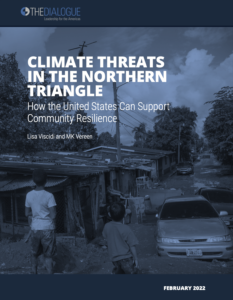 |
Climate Threats in the Northern Triangle: How the United States can Support Community ResilienceFebruary 2022 | Lisa Viscidi & MK Vereen This report outlines the impacts of climate change on key sectors, including agriculture and forestry, infrastructure and energy, and finance, and examines how these impacts affect communities. |
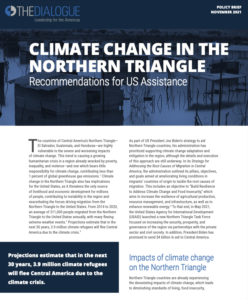 |
Climate Change in the Northern Triangle: Recommendations for US Assistance
November 2021
This policy brief describes the main challenges and provides broad recommendations for the US strategy on climate change adaptation in the region. |
Events
Task Force Members
Carolina Amaya Tobar, Member, Climate and Energy Team, Salvadoran Ecological Unit (UNES)
María Eugenia Brizuela de Ávila, Director, Inversiones Vision; Former Minister of Foreign Relations, El Salvador
Lola Cabnal, Representative, Indigenous Roundtable on Climate Change in Guatemala (MICCG)
Frances Colón, Senior Director, International Climate Affairs, Center for American Progress (CAP)
Graciela Coy, President, Asociación Ak’ Tenamit
Melvin Cruz, Executive Director, Fundación Madera Verde
Sergio Guzmán, Project Manager, Guatecarbon; Representative, Association of Forest Communities of Petén (ACOFOP)
Juliette Handal, Former President, Honduran Council of Private Enterprise (COHEP); Former Minister of Industry and Commerce, Honduras
Karla Lorena Hernández, Manager, Regional Operations Entity (EPR), Central American Electrical Interconnection System (SIEPAC)
Cristina Elizabeth Hernández Díaz, General Coordinator and Chief of Project Design and Management, Network of Environmental Researchers of El Salvador (REDIA)
Susan Kandel, Deputy Director, Fundación PRISMA
José Daniel Madrigal, Public Relations Director and Founding Member, Sustenta Honduras
Miriam Miranda, Coordinator, Honduran Black Fraternal Organization (OFRANEH)
Juan Cruz Monticelli, Chief of Section, Sustainable Energy, Organization of American States (OAS)
Ana Patricia Orantes Thomas, Former Secretary, Secretariat of Planning and Programming of the Presidency of Guatemala (SEGEPLAN); Founder and Co-Director, Movimiento Semilla
Ana R. Ríos, Senior Specialist, Natural Resources and Climate Change, Inter-American Development Bank (IDB)
María Fernanda Rivera, President, National Enterprise Council (CNE), Guatemala
Eduardo Stein, Former Vice President, Guatemala; UN Special Representative for Venezuelan Migrants and Refugees; Member of the Inter-American Dialogue
Leyla Zelaya, National Coordinator, CityAdapt San Salvador
Related Content
El impacto del cambio climático en el Triángulo NorteSeptember 24, 2021 | Lisa Viscidi | Voice of America |
||
|
April 21, 2021 | Nate Graham, Jamie Dorner & José Daniel Madrigal | Voces |
Funders
The Task Force on Climate Change in the Northern Triangle is possible thanks to the generous support of the Open Society Foundations. The Inter-American Dialogue is a non-partisan organization deeply committed to intellectual independence. While donors are encouraged to participate in our activities, funders do not and have never influenced our research or programs. Our directors, members, staff, and constituents represent many views and our funding sources are diverse. All contributions conform to the Dialogue’s internal donor guidelines and US tax laws. The Dialogue is transparent in listing all donors in our Annual Report and on our website. Additionally, 990s are readily available to any individual or organization upon request.
Contact
Director, Energy Transition and Climate Program | dstevens@thedialogue.org


























